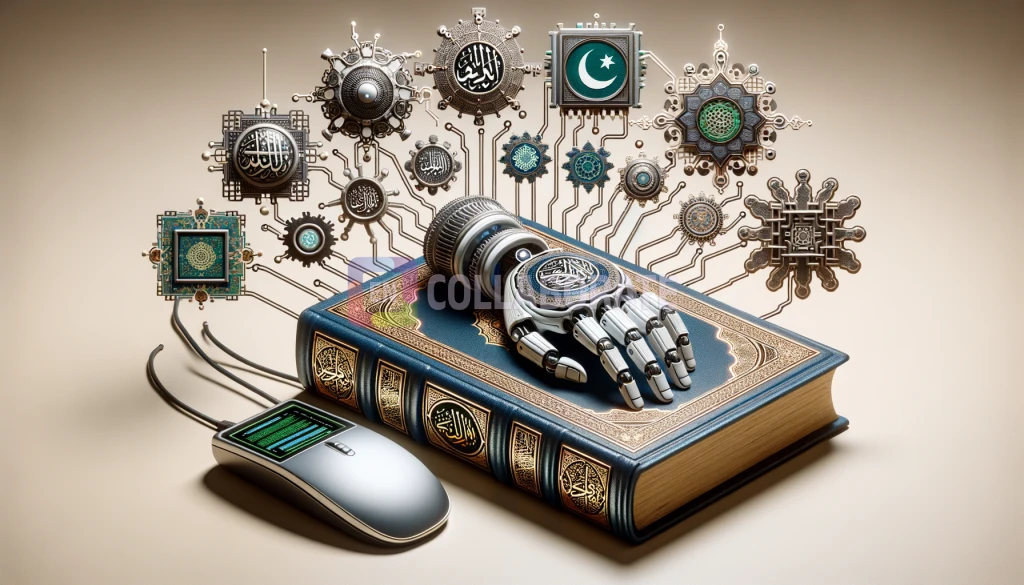AI Islam
**AI's Impact on Islam: Exploring the Quran, Hadith, and Technological Evolution**
Posted by En Collab / 10 months ago

In the era of AI, understanding Islam's essence becomes crucial. Drawing upon the Quran and the hadith, this article analyzes the impact of AI on Islamic principles, considering both benefits and risks. It explores how AI can enhance Islamic practices while addressing
AI's Impact on Islam: Exploring the Quran, Hadith, and Technological Evolution
What is Islam?
Islam, meaning submission to the will of God, is a monotheistic religion based on the teachings of the Prophet Muhammad. Muslims believe in the oneness of God (Allah) and Muhammad as his final prophet. The sacred texts of Islam are the Quran, revealed to Muhammad by Allah, and the Hadith, a collection of sayings and actions attributed to Muhammad.
The Quran and the Hadith
The Quran is the central religious text of Islam, believed by Muslims to be the literal word of God. It contains teachings on faith, ethics, law, and history, providing guidance for all aspects of Muslim life. The Hadith is a collection of accounts of Muhammad's words, actions, and personal life, serving as a secondary source of Islamic law and guidance.
The Benefits of AI to Islam
Artificial intelligence (AI) has the potential to significantly impact Islam in several ways:
* Text Analysis and Understanding: AI can analyze large amounts of religious texts, such as the Quran and Hadith, to identify patterns, connections, and insights. This can enhance the understanding of Islamic teachings and facilitate research on Islamic theology and jurisprudence.
* Language Translation: AI can translate religious texts into various languages, making them accessible to a wider audience and promoting cross-cultural understanding. This can facilitate the spread of Islam and foster dialogue between different faith communities.
* Educational Tools: AI can be used to develop educational apps and interactive tools that make learning about Islam more engaging and accessible. These can be particularly beneficial for younger generations and non-native speakers.
* Virtual Reality Experiences: AI can create immersive virtual reality (VR) experiences that allow users to visit holy sites like Mecca and Medina, enhancing their spiritual connection and strengthening their faith.
The Risks of AI to Islam
While AI offers many benefits, it also poses potential risks to Islam:
* Misinterpretation and Bias: AI algorithms may interpret religious texts in ways that are biased or misaligned with Islamic beliefs. This could lead to inaccuracies, misrepresentations, or the spread of extremist ideologies.
* Alteration and Manipulation: AI systems could potentially be used to alter or manipulate religious texts, undermining their authenticity and integrity. This could have serious consequences for Islamic teachings and the faith of believers.
* Dependence and Automation: Over-reliance on AI for religious guidance and interpretation could reduce the need for human scholars and experts. This could lead to a decline in traditional Islamic knowledge and the loss of critical thinking skills.
Conclusion
The impact of AI on Islam is a complex and multifaceted issue. While AI has the potential to enhance the understanding, dissemination, and practice of Islam, it also poses potential risks that need to be addressed.
To harness the benefits and mitigate the risks, it is crucial for Islamic scholars, theologians, and AI experts to collaborate in shaping the development and application of AI in the context of Islam. This will ensure that AI remains a tool for progress and enlightenment, in line with the teachings of the Quran and the Hadith.
Categories
- All Categories
- Technology
- AI Food
- AI Art
- AI Assistant
- AI Code
- AI Self-Help
- AI Composer
- AI Halal
- AI Islam
Hashtags
Share
Share blog post to social media: